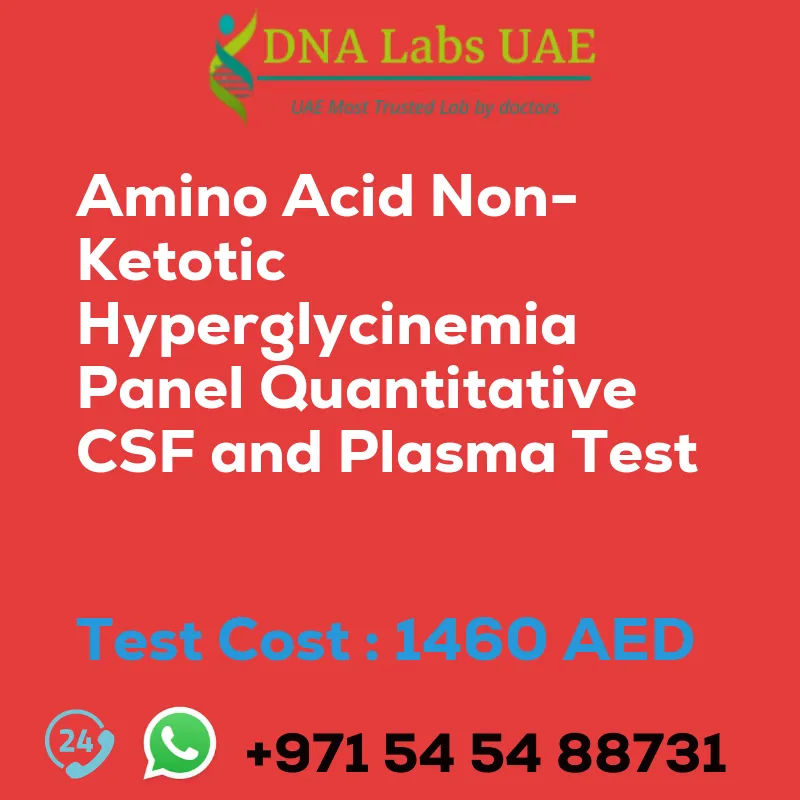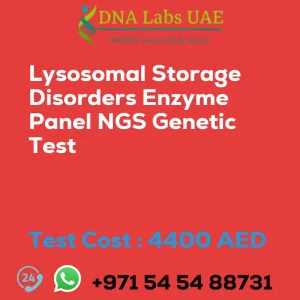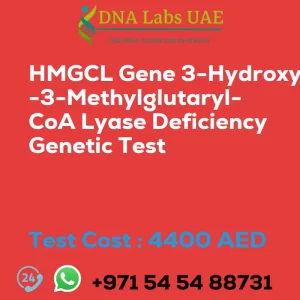AMINO ACID NON-KETOTIC HYPERGLYCINEMIA PANEL QUANTITATIVE CSF and PLASMA Test
Test Name: AMINO ACID NON-KETOTIC HYPERGLYCINEMIA PANEL QUANTITATIVE CSF and PLASMA Test
Components: Price 1460.0 AED
Sample Condition: 1 mL (0.5 mL min.) CSF in a sterile screw capped vial AND 2 mL (1 mL min.) plasma from 1 Green Top (Sodium Heparin) tube. Transfer plasma into a sterile screw capped vial. Ship refrigerated or frozen. Clinical details and drug history must accompany sample. CSF & Plasma specimens should be drawn at the same time.
Report Delivery: SampleMon / Wed by 5 pm; Report 3 days
Method: LC-MS/MS
Test Type: Inborn errors of metabolism
Doctor: Pediatrician
Test Department: GENETIC
Pre Test Information: Clinical details and drug history must accompany sample. CSF & Plasma specimens should be drawn at the same time.
Test Details
The Amino Acid Non-Ketotic Hyperglycinemia Panel Quantitative CSF & Plasma test is a diagnostic test used to measure the levels of amino acids in the cerebrospinal fluid (CSF) and plasma of an individual suspected to have non-ketotic hyperglycinemia (NKH). NKH is a rare genetic disorder characterized by the accumulation of glycine, an amino acid, in the body. This accumulation leads to high levels of glycine in the CSF and plasma, causing severe neurological symptoms.
The test involves collecting samples of CSF and plasma from the patient and analyzing them in a laboratory. The laboratory will measure the levels of glycine and other amino acids in the samples and compare them to normal reference ranges. By quantifying the levels of amino acids, particularly glycine, in the CSF and plasma, the test can help confirm a diagnosis of NKH. It can also provide information about the severity of the condition and guide treatment decisions.
It is important to note that this test is specialized and not commonly performed in all laboratories. It is typically ordered by a healthcare provider who suspects NKH based on the patient’s symptoms and clinical presentation. Genetic testing may also be done to confirm the diagnosis.
The results of the test, along with other clinical and genetic information, will be used by healthcare professionals to determine the appropriate management and treatment plan for the patient. Treatment for NKH may include dietary modifications, medications, and supportive therapies to manage symptoms and prevent complications.
| Test Name | AMINO ACID NON-KETOTIC HYPERGLYCINEMIA PANEL QUANTITATIVE CSF and PLASMA Test |
|---|---|
| Components | |
| Price | 1460.0 AED |
| Sample Condition | 1 mL (0.5 mL min.) CSF in a sterile screw capped vial AND2 mL (1 mL min.) plasma from 1 Green Top (Sodium Heparin) tube. Transfer plasma into a sterile screw capped vial. Ship refrigerated or frozen. Clinical details and drug history must accompany sample. CSF & Plasma specimens should be drawn at the same time. |
| Report Delivery | SampleMon / Wed by 5 pm; Report 3 days |
| Method | LC-MS/MS |
| Test type | Inborn errors of metabolism |
| Doctor | Pediatrician |
| Test Department: | GENETIC |
| Pre Test Information | Clinical details and drug history must accompany sample. CSF & Plasma specimens should be drawn at the same time. |
| Test Details |
The Amino Acid Non-Ketotic Hyperglycinemia Panel Quantitative CSF & Plasma test is a diagnostic test used to measure the levels of amino acids in the cerebrospinal fluid (CSF) and plasma of an individual suspected to have non-ketotic hyperglycinemia (NKH). NKH is a rare genetic disorder characterized by the accumulation of glycine, an amino acid, in the body. This accumulation leads to high levels of glycine in the CSF and plasma, causing severe neurological symptoms. The test involves collecting samples of CSF and plasma from the patient and analyzing them in a laboratory. The laboratory will measure the levels of glycine and other amino acids in the samples and compare them to normal reference ranges. By quantifying the levels of amino acids, particularly glycine, in the CSF and plasma, the test can help confirm a diagnosis of NKH. It can also provide information about the severity of the condition and guide treatment decisions. It is important to note that this test is specialized and not commonly performed in all laboratories. It is typically ordered by a healthcare provider who suspects NKH based on the patient’s symptoms and clinical presentation. Genetic testing may also be done to confirm the diagnosis. The results of the test, along with other clinical and genetic information, will be used by healthcare professionals to determine the appropriate management and treatment plan for the patient. Treatment for NKH may include dietary modifications, medications, and supportive therapies to manage symptoms and prevent complications. |








